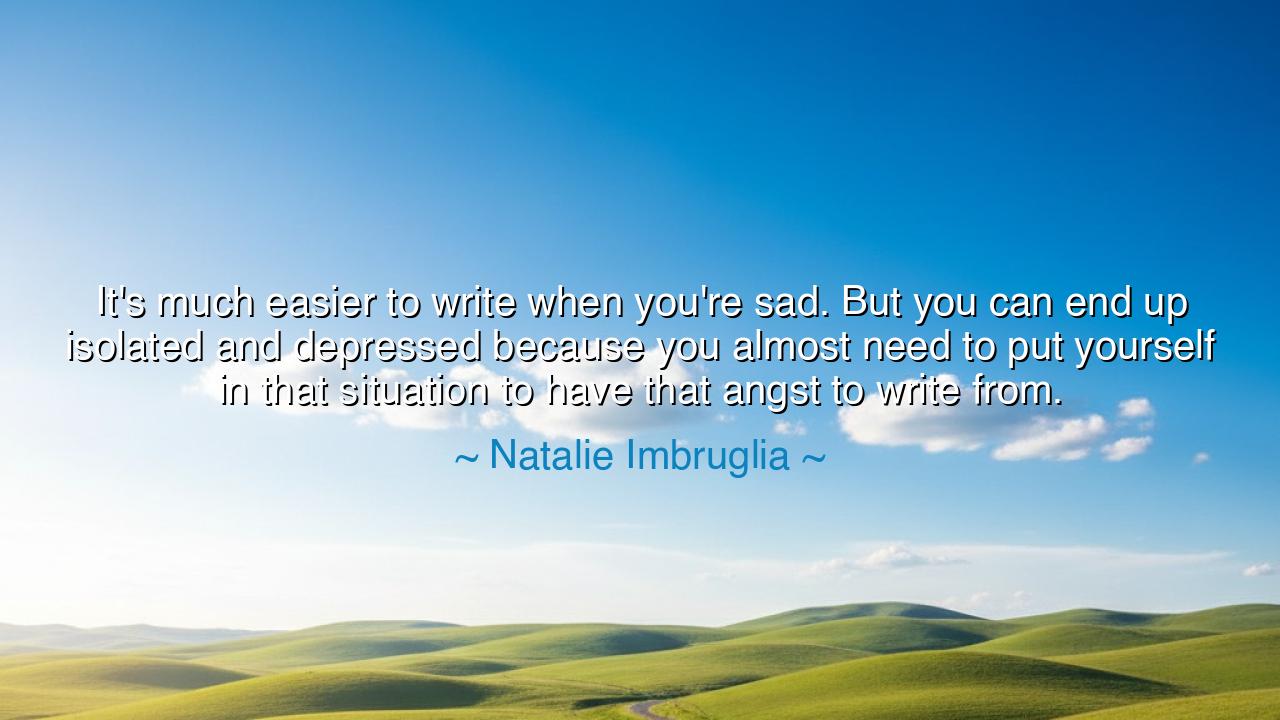
It's much easier to write when you're sad. But you can end up
It's much easier to write when you're sad. But you can end up isolated and depressed because you almost need to put yourself in that situation to have that angst to write from.






Natalie Imbruglia once confessed with haunting clarity: “It’s much easier to write when you’re sad. But you can end up isolated and depressed because you almost need to put yourself in that situation to have that angst to write from.” In these words she unveils the paradox of the artist’s life: sorrow sharpens the pen, but it also risks breaking the soul. This truth is as old as art itself—creativity often blooms from suffering, yet suffering can consume the one who wields it.
The ancients knew this tension well. The poet Homer sang of rage and grief, and from that grief carved the Iliad, one of the greatest epics known to humanity. The tragedians of Athens drew their power not from delight but from lamentation, weaving tales of loss and downfall to move the hearts of their audiences. In Natalie’s words, we hear the same lineage: that sadness, when refined into art, becomes universal truth. But the danger lies in remaining too long in the shadows, mistaking pain as the only source of beauty.
Consider the tale of Sylvia Plath, a writer whose greatest works were infused with the intensity of despair. Her poems, filled with raw angst, still cut into the hearts of readers generations later. Yet the same depression that fueled her work also devoured her life. Here lies the lesson Imbruglia warns of: the line between using sorrow and being consumed by it is perilously thin. The artist must learn to step close enough to the fire to find warmth, yet not so close as to be burned.
Her words also reveal the temptation of isolation. When one learns that writing flows easily from grief, there arises the danger of seeking out that grief, of retreating into solitude and pain as if they were necessary tools. But this is a trap. For while sorrow sharpens the voice, it is the perspective—the stepping back, the seeing of the “big picture”—that allows the work to transcend personal misery and become something that speaks to the world. Without that distance, the work collapses inward, and the artist remains imprisoned.
The meaning of her reflection is thus twofold: first, that sadness is indeed a fertile soil for art, but second, that it must be tempered with self-awareness. The finest creations do not come from drowning in sorrow but from transforming it. The angst must be a spark, not a chain. Great writing arises not when the artist is lost in despair, but when they can shape despair into something meaningful, something that offers light to others still wandering in the dark.
The lesson for us is clear: honor your pain, but do not become enslaved to it. When sadness comes, use it to deepen your perspective, to give weight to your words, to create something authentic. But do not court despair, do not isolate yourself in search of endless angst. Balance grief with joy, solitude with community, silence with laughter. The strongest art springs not from endless darkness, but from the contrast between light and shadow.
Practically, this means caring for yourself as much as for your work. Seek out the beauty of nature, the company of friends, the grounding of family, even as you honor the sorrows that shape your voice. When writing, draw upon your emotions honestly, but learn when to step away from them. For the gift of creation is not meant to destroy its creator—it is meant to heal, to connect, and to remind both writer and reader that sorrow can be transformed into song.
Thus, Natalie Imbruglia’s words stand as a torch of warning and guidance. Yes, it is easier to write when one is sad—but art must not be built only on despair. To endure, to create, to live fully, the artist must learn to balance the shadows with the light. In this balance lies not only great writing, but a life that is itself a work of art.






AAdministratorAdministrator
Welcome, honored guests. Please leave a comment, we will respond soon